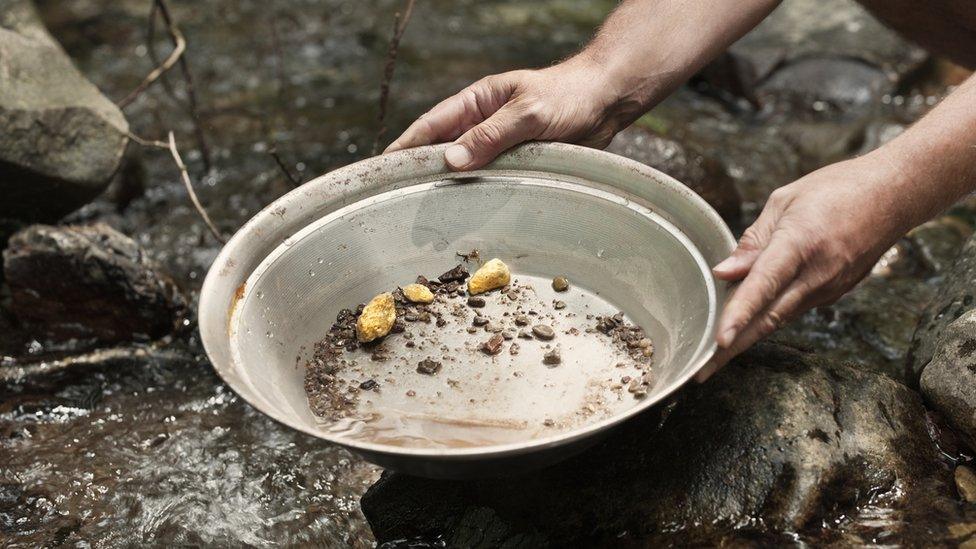Snowdonia: Man guilty of panning for gold in Afon Wen
- Published

Brian Wright disputed being caught red-handed by Natural Resources Wales
A man has been found guilty of illegally panning for Welsh gold during a trip to Snowdonia.
Brian Wright, from Oxfordshire, was found with a jar of gold dust near Dolgellau, Gwynedd, which he had collected on his trip last August.
The 65-year-old, who had denied the offences, claimed he had been showing an enforcement officer how to pan for gold.
He was fined £600 at Llandudno Magistrates' Court on Thursday.
Welsh gold has been used in royal wedding rings including those of the Duke and Duchess of Cambridge.
The so-called "Dolgellau gold-belt" is said to stretch almost to Trawsfynydd from Cardigan Bay.
Dafydd Roberts, prosecuting, told the court a sign at Afon Wen, near Dolgellau, Gwynedd, had outlined panning for gold was banned, but that Wright was filmed carrying out the activity.
However, Wright, of Henley-on-Thames, said: "It's my belief that sign is incorrect. I believe I know how the regulations should be interpreted."
Mr Roberts claimed Wright had alleged he was "set up" by Natural Resources Wales (NRW) when they filmed him and that he was not panning at the time.
Patrick Gartland, defending, said the court had to be satisfied his client was gold-panning on two days last summer, 18 and 19 August.
Wright sought to promote the cultural element of gold-panning, he said.

He was found guilty of panning for gold at Llandudno Magistrates' Court
District judge Gwyn Jones said Wright was courteous but had strong views, having told NRW that he would not stop gold-panning "on my principles."
Wright told the judge gold-panning was "part of the cultural heritage" and had been putting on "a demonstration" for the enforcement officer.
"I was showing them goodwill," he said.
Judge Jones dismissed the suggestion he was "set-up."
Wright was found guilty of three offences of digging up or removing gravel, sands or minerals at Afon Wen, and operating a metal detector on NRW land.
Wright, who the court heard was on benefits, was fined £600 and ordered to pay £2,400 costs.
After the case, Dylan Williams, from NRW said: "Illegal gold panning has the potential to adversely impact the river ecosystem.
"The process of digging up of the riverbed and bank can result in direct damage to plants or invertebrates and fish spawning grounds can be damaged. The flow of the river can also be altered.
"We hope the fine handed out will make people think twice before illegally panning gold at Coed y Brenin Forest, and across other special sites in the future."
Related topics
- Published25 May 2022

- Published24 June 2021

- Published11 August 2021
